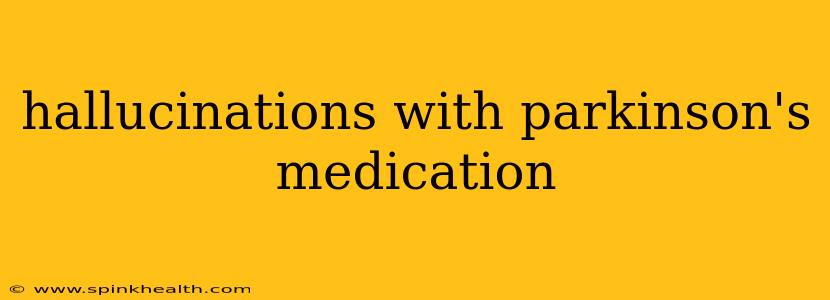Parkinson's disease, a progressive neurological disorder, often necessitates medication to manage its debilitating symptoms. However, a troubling side effect for some patients is the experience of hallucinations. This isn't uncommon, and understanding the causes, recognizing the symptoms, and exploring management strategies is crucial for both patients and caregivers. Let's delve into this complex issue.
What are the common causes of hallucinations in Parkinson's patients taking medication?
Many medications used to treat Parkinson's disease can, unfortunately, lead to hallucinations as a side effect. The most common culprit is levodopa, a crucial drug often prescribed to replenish dopamine levels in the brain. While levodopa is incredibly effective at managing motor symptoms, in some individuals, it can disrupt the delicate balance of neurotransmitters, potentially triggering hallucinations. The higher the dose, and the longer it's used, the greater the risk seems to be. Other medications, such as dopamine agonists (like pramipexole and ropinirole), also carry this risk, albeit often to a lesser extent. The exact mechanism isn't fully understood, but it's thought to involve an imbalance in dopamine signaling within the brain.
What types of hallucinations are common?
Hallucinations experienced by Parkinson's patients on medication vary widely. They can range from simple visual disturbances, such as seeing flickering lights or shadows, to complex, vivid hallucinations involving people, objects, or events that aren't really there. These hallucinations can be frightening and disorienting. Some patients report auditory hallucinations, such as hearing voices or noises, and less frequently, tactile hallucinations (feeling things that aren't there). The nature of these hallucinations can shift over time, and their intensity can fluctuate based on medication dosage, time of day, and other factors.
How can I tell if my hallucinations are related to my Parkinson's medication?
Differentiating medication-induced hallucinations from other potential causes requires careful observation and consultation with a neurologist. Keeping a detailed journal documenting the timing of hallucinations in relation to medication intake can be invaluable. Factors like the intensity and content of the hallucinations, as well as any changes in medication regimen, should be noted. Your neurologist will consider your medical history, medication list, and the nature of the hallucinations to determine the likely cause. Other conditions, such as sleep deprivation or underlying mental health issues, should also be considered.
How are hallucinations in Parkinson's patients treated?
Managing medication-induced hallucinations involves a multifaceted approach. Often, the first step is to adjust the medication dosage or schedule. Reducing the dose of levodopa or dopamine agonists, or switching to alternative medications, can sometimes alleviate the hallucinations. Your doctor might also explore different drug delivery methods, such as using patches or continuous infusions, to provide a more consistent dopamine level and reduce fluctuations that can trigger hallucinations. In some cases, adding other medications, such as clozapine or quetiapine, can help manage the hallucinations. However, these medications also come with their own potential side effects, which need to be carefully weighed against the benefits.
Are there any non-medication strategies to manage hallucinations?
Alongside medication adjustments, non-pharmacological approaches can play a crucial role in managing hallucinations. These can include:
- Cognitive behavioral therapy (CBT): This therapeutic approach helps patients understand and cope with their hallucinations, reducing their distress and impact on daily life.
- Reality orientation therapy: This involves techniques to reinforce the patient's awareness of their surroundings and the reality of their situation.
- Support groups: Connecting with others facing similar challenges can provide emotional support and practical advice.
- Environmental modifications: Adjusting lighting, minimizing clutter, and ensuring a safe and familiar environment can minimize triggers for hallucinations.
What is the long-term outlook for someone with Parkinson's and medication-induced hallucinations?
The prognosis for managing hallucinations in Parkinson's patients varies. For some, careful medication adjustments and supportive therapies can effectively reduce or eliminate hallucinations. For others, managing the hallucinations may require a more complex approach, involving a combination of medication and non-pharmacological strategies. Regular monitoring by a neurologist is crucial to ensure the ongoing effectiveness of the treatment plan and to adjust it as needed. Open communication between the patient, caregiver, and medical team is essential for successful management. The journey is not always easy, but with the right support and approach, the impact of hallucinations can be significantly mitigated.

